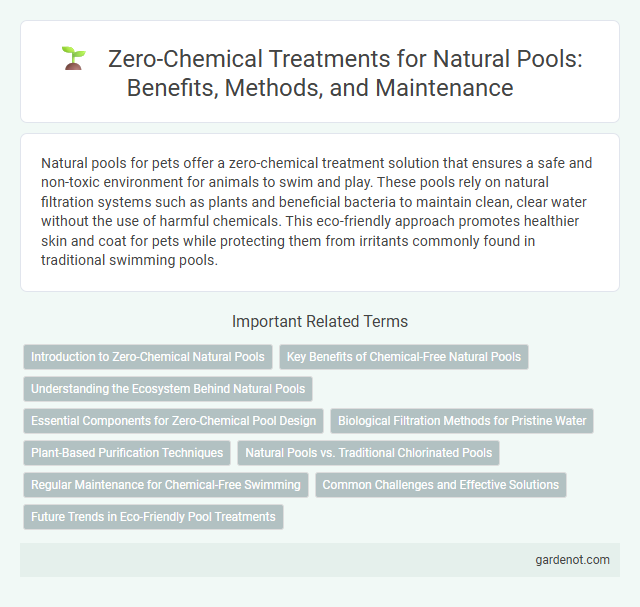Natural pools for pets offer a zero-chemical treatment solution that ensures a safe and non-toxic environment for animals to swim and play. These pools rely on natural filtration systems such as plants and beneficial bacteria to maintain clean, clear water without the use of harmful chemicals. This eco-friendly approach promotes healthier skin and coat for pets while protecting them from irritants commonly found in traditional swimming pools.
Introduction to Zero-Chemical Natural Pools
Zero-chemical natural pools rely on biological processes and plant filtration instead of synthetic chemicals to maintain water clarity and safety. These pools use a combination of beneficial bacteria, aquatic plants, and natural filtration systems to create a balanced ecosystem that prevents algae growth and harmful pathogens. The absence of chlorine and other chemicals provides a healthier, eco-friendly swimming environment while preserving local biodiversity.
Key Benefits of Chemical-Free Natural Pools
Chemical-free natural pools rely on biological filtration systems, promoting a healthy aquatic ecosystem without harmful additives. These pools enhance swimmer wellbeing by eliminating exposure to chlorine and other toxic chemicals, reducing skin and eye irritation. Eco-friendly and sustainable, they support local biodiversity and minimize environmental impact while providing crystal-clear, naturally purified water.
Understanding the Ecosystem Behind Natural Pools
Zero-chemical treatment in natural pools relies on a carefully balanced ecosystem where beneficial plants, microorganisms, and natural filtration systems maintain water clarity and quality without synthetic additives. The roots of aquatic plants absorb nutrients that would otherwise feed algae, while bacteria break down organic matter, ensuring a self-sustaining cycle. This synergy mimics natural water bodies, creating a healthy, eco-friendly swimming environment free from chlorine or harmful chemicals.
Essential Components for Zero-Chemical Pool Design
Natural pools rely on a combination of biological filtration, aquatic plants, and gravel substrates to maintain water clarity without chemical treatments. Key components include a regeneration zone filled with diverse plants that absorb nutrients, a mechanical filtration system to remove debris, and a carefully balanced ecosystem that promotes beneficial bacteria growth. These elements work synergistically to create a sustainable, chemical-free swimming environment.
Biological Filtration Methods for Pristine Water
Biological filtration methods utilize beneficial bacteria and natural substrates to break down organic matter, reducing the need for chemical treatments in natural pools. These systems rely on biofilters and plant-based filtration zones to maintain water clarity and promote a balanced ecosystem. Effective biological filtration enhances water quality by fostering microbial activity that naturally decomposes contaminants, ensuring pristine, chemical-free swimming environments.
Plant-Based Purification Techniques
Natural pools utilize zero-chemical treatment methods by harnessing plant-based purification techniques that mimic natural aquatic ecosystems. These systems incorporate biofilters, aquatic plants, and beneficial bacteria to effectively remove impurities and maintain water clarity without harmful chemicals. The integration of species like water lilies, reeds, and cattails supports oxygenation and nutrient absorption, promoting a balanced and sustainable water environment.
Natural Pools vs. Traditional Chlorinated Pools
Natural pools use biological filtration and aquatic plants to maintain water clarity without relying on chemical treatments, promoting a healthier ecosystem for swimmers and local wildlife. Unlike traditional chlorinated pools, which use chlorine to kill bacteria and algae, natural pools foster natural processes that balance water quality without harmful chemicals or synthetic additives. This chemical-free approach reduces skin and eye irritation while supporting biodiversity and sustainable water management.
Regular Maintenance for Chemical-Free Swimming
Regular maintenance of a natural pool involves consistent removal of debris, monitoring water clarity, and ensuring a balanced ecosystem to prevent algae growth without chemicals. Utilizing biological filters and aquatic plants promotes natural water purification, supporting chemical-free swimming conditions. Routine skimming, vacuuming, and replenishing beneficial bacteria are essential practices for sustaining clear, healthy water in a zero-chemical treatment natural pool.
Common Challenges and Effective Solutions
Zero-chemical treatment in natural pools faces common challenges such as algae bloom, water clarity issues, and microbial imbalances. Effective solutions include implementing robust filtration systems, maintaining balanced aquatic plants for natural biofiltration, and ensuring proper water circulation to inhibit algae growth. Regular monitoring of pH levels and nutrient inputs helps sustain a healthy ecosystem without chemical intervention.
Future Trends in Eco-Friendly Pool Treatments
Zero-chemical treatment in natural pools relies on innovative biological filtration systems and plant-based purification to maintain water clarity and safety. Future trends emphasize integrating smart sensors and AI technology for real-time water quality monitoring, reducing dependency on manual adjustments. Emerging eco-friendly treatments also explore the use of native aquatic plants and renewable energy sources to enhance sustainability and minimize environmental impact.
Zero-chemical treatment Infographic

 gardenot.com
gardenot.com